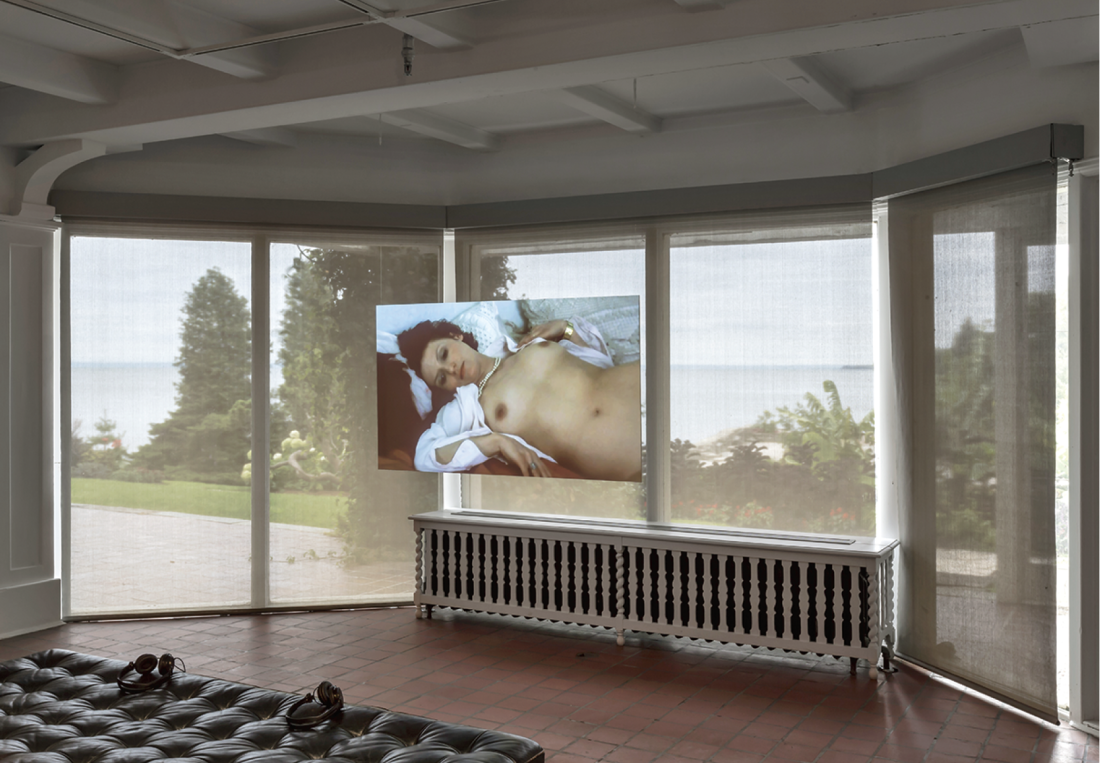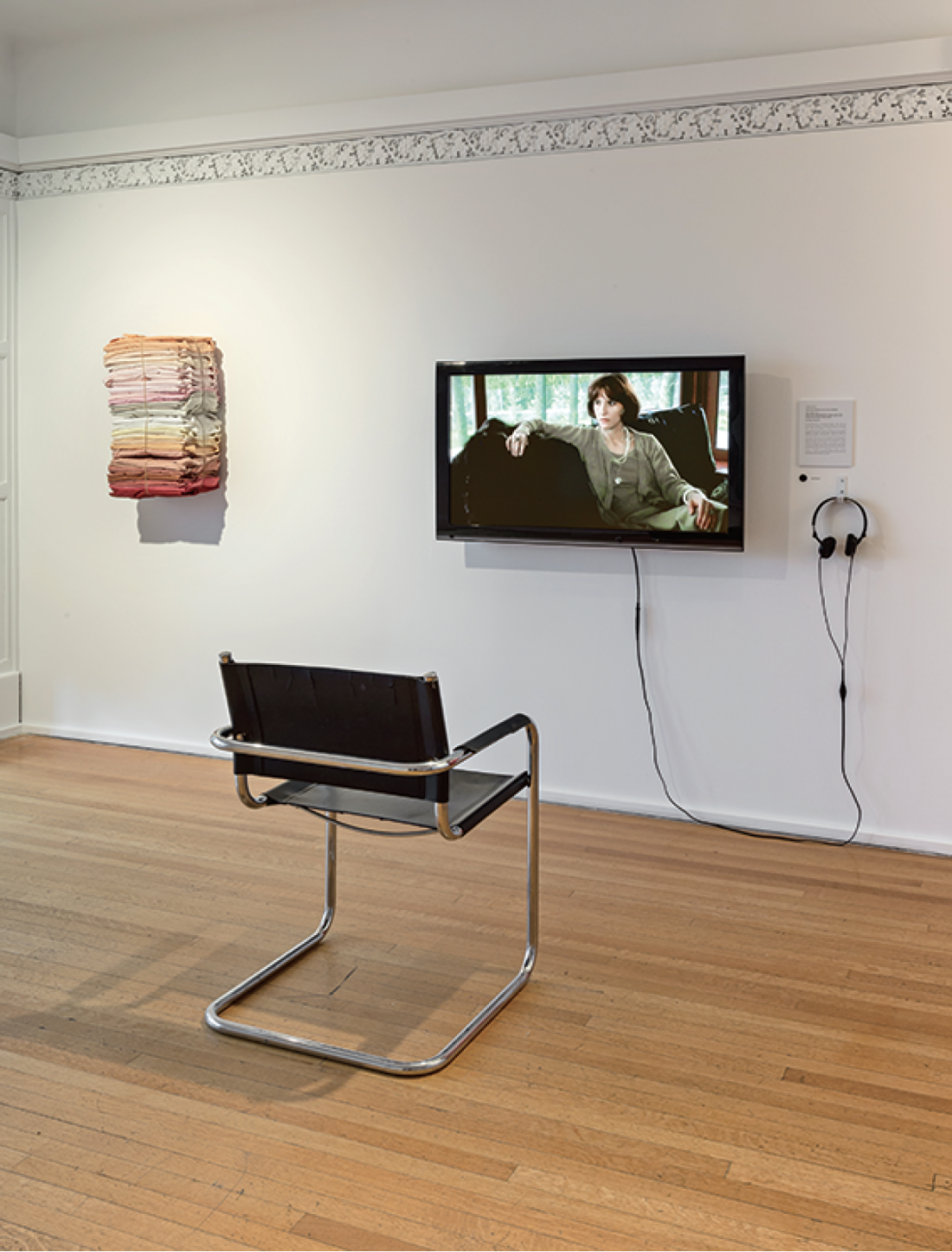Aleesa Cohene
Aleesa Cohene has become known in her native Canada as well as throughout the international film festival circuit for her unique video installations appropriated from found cinematic footage. Drawing upon an extensive archive of films, Cohene seamlessly reassembles video clips anew in service of creating what she terms the composite—a character comprised of multifarious identities. In general, Cohene’s work can be considered an ongoing investigation into the subjective experience of cinematic forms and conventions, but in her recent solo exhibition “I Know You Know” at Oakville Galleries in Gairloch Gardens (a cinematic setting in its own right), her work with found footage expands significantly beyond its source to tackle the complexities of human consciousness, trauma and healing.
Over a two-part video installation, we are invited to eavesdrop on two psychoanalysis sessions. In Cohene’s structure, the various actresses we track on screen come to embody the composite character of a female analyst, while the narrative voiceovers (one male, one female) represent her two distinct patients (or analysands). Not much happens on screen, and intentionally so. Yet all the minutia adds up to evoke a greater atmosphere. The interstitial stuff of cinema—an actress languidly draws on a cigarette, scribbles on a notepad, gazes pensively into the middle distance—Cohene gathers this raw material masterfully, developing a character that the viewer can choose to alternately inhabit or observe. Interestingly, the free-associative narration layered overtop of the edited footage has the same effect, offering a dual subject position for the viewer to occupy. If watched in a focused manner, slowly but surely Cohene’s videos begin to replicate the cognitive and emotional experience of therapy, with the result of drawing us into another consciousness entirely.

Aleesa Cohene, installation view, Hate You with Zanette Singh, 2014, video, 8 min. Photographs: Toni Hafkenscheid. All images courtesy the artist and Oakville Galleries.
The first part of Cohene’s video series, That’s Why We End, 2012–2014, is viewed subsequently over three monitors. Hate You, 2014, the second part of the series, is projected on a screen suspended in front of a window with a view onto Lake Ontario, and if you are fortunate, a sunset view. It’s an unusual installation choice for a video projection, to let the outside in, but here it works beautifully to transcend the white cube, facilitating our immersion into Cohene’s fictional therapy office. The more recent and most dynamic of all the video parts, Hate You offers a sustained glimpse into the mind of the therapist by means of a sophisticated interplay of editing cuts, voiceover and musical score.
Anyone who has undergone therapy will know that the objects in a therapist’s office can become loci for unusual fixation. A striped cushion on the sofa, the tchotchkes lining a bookshelf, a kitsch landscape hanging on the wall, all can serve as a means to focus one’s attention throughout the therapeutic process (or alternately, as a way to disassociate). These otherwise marginal objects can become etched into consciousness, gathering undue significance.
Cohene takes up this phenomenon, placing mysterious artifacts throughout the galleries, which, upon watching the videos, slowly reveal their implication within the larger narrative of the therapy sessions. A stack of folded men’s dress shirts is mounted to the gallery wall (That’s Why We End, 2012–14). A bunch of onyx grapes sits discreetly in another corner (You, Dear, 2014). Upon closer encounter, these objects emit a scent, which Cohene has imbued into the objects, as a way to further elicit a subjective encounter. In the most successful of these object presentations, I Know You Know, 2014, Cohene collaborated with well-known Canadian painter Brad Phillips to reproduce a landscape painting seen in the background of one of the film clips, or, in Cohene’s universe, hanging in the therapist’s office. The muddy watercolour reproduction hangs in the gallery within view of the video, and by virtue of a pair of headphones mounted below the painting, we come to understand that Cohene, herself a novice painter, created it with Phillip’s careful instruction given over twelve hours and multiple sessions. The recording, edited down to nearly two and a half hours, is a delight, capturing the dynamic interaction and convivial banter that results as one artist generously teaches another. One can’t help but conclude that this collaboration is a form of therapy in itself, a livelier or lighter version perhaps, of the more formal therapeutic processes explored in Cohene’s videos. ❚

Aleesa Cohene, installation view (detail), That’s Why We End with Eric Cazdyn, 2012–2014, three-channel video, Mart Stam armchairs, notepads, pyrite, dress shirts, bowtie, scent: ambrette seed, cucumber, grass, neroli, orange flower blossom, tomato stems.
“I Know You Know” was exhibited at Oakville Galleries in Gariloch Gardens, Oakville, from September 14, 2014 to January 4, 2015.
Leah Turner is a Canadian living in Berlin.

